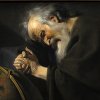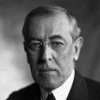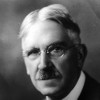“ If a person cannot foresee the consequences of his act, and is not capable of understanding what he is told about its outcome by those with more experience, it is impossible for him to guide his act intelligently. ”
John Dewey, Democracy and Education (1916). copy citation
| Author | John Dewey |
|---|---|
| Source | Democracy and Education |
| Topic | understanding experience |
| Date | 1916 |
| Language | English |
| Reference | |
| Note | |
| Weblink | http://www.gutenberg.org/files/852/852-h/852-h.htm |
Context
“In general, the occasion for the more conscious acts of control should be limited to acts which are so instinctive or impulsive that the one performing them has no means of foreseeing their outcome. If a person cannot foresee the consequences of his act, and is not capable of understanding what he is told about its outcome by those with more experience, it is impossible for him to guide his act intelligently. In such a state, every act is alike to him. Whatever moves him does move him, and that is all there is to it. In some cases, it is well to permit him to experiment, and to discover the consequences for himself in order that he may act intelligently next time under similar circumstances.”
source



